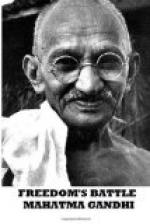SWARAJ IN NINE MONTHS
Asked by the Times representative as to his impressions formed as a result of his activities during the last three months, Mr. Gandhi said:—“My own impression of these three months’ extensive experience is that this movement of non-co-operation has come to stay, and it is most decidedly a purifying movement, in spite of isolated instances of rowdyism, as for instance at Mrs. Besant’s meeting in Bombay, at some places in Delhi, Bengal, and even in Gujarat. The people are assimilating day after day the spirit of non-violence, not necessarily as a creed, but as an inevitable policy. I expect most startling results, more startling than, say, the discoveries of Sir J.C. Bose, or the acceptance by the people of non-violence. If the Government could be assured beyond any possibility of doubt that no violence would ever be offered by us the Government would from that moment alter its character, unconsciously and involuntarily, but nonetheless surely on that account.”
“Alter its character,—in what, direction?” asked the Times representative.
“Certainly in the direction which we ask it should move—that being in the direction of Government becoming responsive to every call of the nation.”
“Will you kindly explain further?” asked the representative.
“By that I mean,” said Mr. Gandhi, “people will be able by asserting themselves through fixed determination and self-sacrifice to gain the redress of the Khilafat wrong, the Punjab wrong, and attain the Swaraj of their choice.”
“But what is your Swaraj, and where does the Government come in there—the Government which, you say will alter its character unconsciously?”
“My Swaraj,” said Mr. Gandhi, “is the Parliamentary Government of India in the modern sense of the term for the time being, and that Government would be secured to us either through the friendly offices of the British people or without them.”
“What do you mean by the phrase, ‘without them!’” questioned the interviewer.
“This movement,” continued Mr. Gandhi, “is an endeavour to purge the present Government of selfishness and greed which determine almost every one of their activities. Suppose that we have made it impossible by disassociation from them to feed their greed. They might not wish to remain in India, as happened in the case of Somaliland, where the moment its administration ceased to be a paying proposition they evacuated it.”




